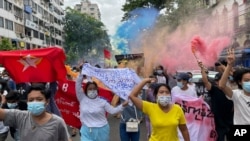Methamphetamine from the super labs of lawless eastern Myanmar is surging as organized crime thrives in the instability caused by the February coup there, experts have told VOA, flooding neighboring countries with narcotics and carving out new channels to reach old markets.
The rugged ungovernable Myanmar borderlands in Shan state are home to what is by many estimates the world’s largest meth trade, orchestrated by the drug lords of the Golden Triangle, an area at the juncture of China, Thailand and Laos.
Countless metric tons of precursor chemicals are moved into the Golden Triangle and then the drugs, mainly meth pills (yaba), the highly addictive crystal meth (ice), and heroin, are sent back across the same borders.
Myanmar’s coup removed the civilian government led by Aung San Suu Kyi. Myanmar has been pitched into chaos since, with more than 1,000 pro-democracy protesters killed by police and the army, which is now fighting multiple ethnic groups and now facing the declaration of war by anti-coup rebels.
Inside the turmoil, drug production has flourished in Shan state, as a blur of allegiances in the pursuit of profit ensure the meth pours out.
“All the indications are that the military coup has been a win-win for these cartels,” Richard Horsey, senior Myanmar adviser to the International Crisis Group told VOA, adding that “super labs” producing ice have gone into overdrive whether they are run by “pro-military militias or anti-military armed groups.”
“Law enforcement activity has greatly decreased and the general chaos creates new opportunities for illicit activities and incentives for all those involved in the trade to take advantage and earn money,” he said.
Shan state is also the world’s second-biggest production area for opium poppies, the base ingredient of heroin. It is not yet clear how the Taliban’s need for income as they return to govern Afghanistan -- the biggest poppy producer -- could skew the market for heroin in Southeast Asia.
Doubled volumes, halved prices
Thailand, since Myanmar’s coup, has seized nearly 330 million yaba pills, according to the Thai Office of Narcotics Control Board, more than double the amount from February through August last year. Ice seizures have stayed on par at around 15 metric tons so far, the ONCB said.
The oversupply is pushing drug prices down, with authorities saying yaba pills now cost as little as $1.70 in Thai border areas, while the cost of a gram of the more addictive and potent ice has been slashed by half to $45.
“If organized crime and their militia partners continue to push the limits of the drug trade in Shan there will be implications for Mekong neighbors like Thailand and Laos -- somewhat into Vietnam and Cambodia,” Jeremy Douglas, regional representative of the United Nations Office on Drugs and Crime for Southeast Asia and the Pacific, said.
“It can’t simply go on as it has been without more significant regional spillover and consequences,” he said.
For Thailand, whose roads, ports and airports have made it the regional hub for drug trafficking, Myanmar’s coup is bad news.
Authorities have tightened security along the mountainous northern border zone adjacent to Myanmar, but that has shifted trafficking eastward so that the drugs are now moved into Laos.
Huge loads are then shuttled across the virtually unpoliceable Mekong River and into Thailand’s northeastern Isaan region, where the coronavirus has decimated incomes, leaving smuggling rings with a deep pool of couriers for their illicit wares.
The Sept. 4 seizure of 4.3 million yaba tablets in a vehicle driven by a 31-year-old mother of two in Nakon Phanom province opposite Laos is a prime example of drug money seeping into poor communities, a local official told VOA.
“Many people who have lost jobs during the pandemic have taken up trafficking, while kids forced out of school have also been swept up into drugs as dealers and users,” said Wassana Srikrason, a village head in nearby Ban Pang district.
“There are more checkpoints along the northern border, so drugs from Myanmar have been pushed through Laos instead and into Thailand,” Wassana said.
The trafficking volumes are so high, he added, that meth packages are now even marked with the Isaan city names where they are due to be “warehoused” before being shipped on to Bangkok, destined for the more lucrative markets of Australia, New Zealand and Japan.
Experts say organized crime syndicates are digging deeper foundations across Southeast Asia eroding threadbare rule of law with corruption.
“The drug situation in the Golden Triangle is becoming more complex and the drug economy in the region is becoming more powerful and influential,” the UNODC’s Douglas said.




